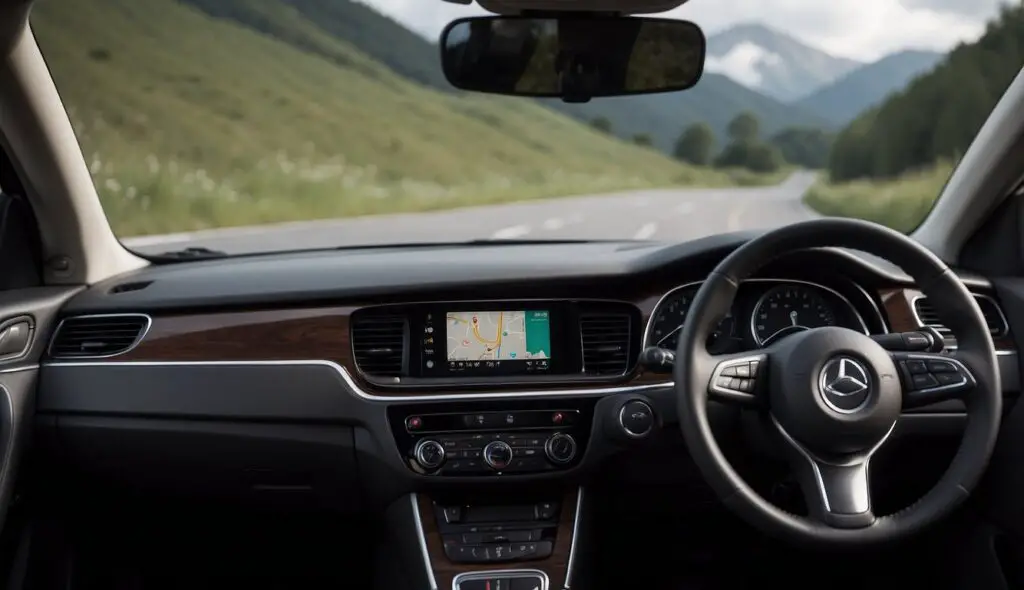You’re driving along, enjoying your day, when suddenly you hear that annoying squeaking noise. It’s not when you’re hitting the brakes, so what could it be? This noise is often caused by the wear indicator of the brake pads touching the rotor. Think of it as your car’s way of telling you the brake pads are getting worn out and might need replacing soon.
Common Causes of Squeaking When Driving

Squeaking noises while driving can be annoying and might signal an issue with various parts of your vehicle. Below, you’ll find explanations of common brake system components and non-brake related issues that could cause these sounds.
Brake System Components
Brake Pads and Rotors
Worn-out brake pads can cause a squeaking noise even when you’re not applying the brakes. The wear indicator on the pads touches the rotor, making a high-pitched sound. This is a sign that your brake pads need replacing soon.
Stuck Brake Caliper
The brake caliper houses the brake pads. If the caliper gets stuck, it can cause the brakes to be applied all the time, which may lead to squeaking. A stuck caliper can also make your car pull to one side while driving.
Anti-Rattle Clips
These clips hold the brake pads in place and prevent them from rattling. If they are missing or broken, the pads can move around and produce noise. Always check these clips during brake maintenance.
Non-Brake Related Issues
Suspension Components
Worn-out suspension parts, like bushings or ball joints, can create squeaking noises while driving. These components help absorb shock and keep your vehicle stable, so it’s essential to keep them in good condition.
Steering System
A squeak in the steering system can be due to low power steering fluid or worn-out components such as tie rod ends. These parts help you steer smoothly, and any issues should be addressed quickly to ensure safe driving.
Wheel Bearings
Worn wheel bearings can also produce squeaking sounds. These bearings help the wheels spin smoothly, and if they are damaged, they need replacement to avoid further problems.
By understanding the different components that can cause squeaking noises while driving, you can better identify and address the issue before it leads to bigger problems.
Diagnosing Squeaking Noise Issues

When you hear a squeaking noise while driving but not when braking, it can be caused by several issues. Discovering the root cause involves either consulting a professional mechanic or performing some DIY troubleshooting steps.
Professional Inspection
Consulting a professional mechanic is crucial when the source of the noise is challenging to identify. Mechanics can inspect the brakes thoroughly to ensure that nothing is out of place or worn out.
They may also examine the brake caliper to see if it’s stuck. Additionally, the mechanic will check the engine for noises that might indicate other underlying problems.
Transmission issues can also cause squeaking noises, and a professional is well equipped to diagnose and fix them.
DIY Troubleshooting Steps
If you prefer to diagnose the problem yourself, start by checking the wear indicators on the brake pads. These small metal tabs create a squeaky noise when the pads are worn down. Another step is to ensure that no small objects are stuck in the wheels.
Inspect the brake calipers to see if they’re sticking. You can also look for any unusual situations in the engine bay or the transmission, like loose parts or fluid leaks.
Using a basic toolkit and having some mechanical knowledge will help with this process. Hashtags like #BrakeCalipers, #EngineInspection, #TransmissionNoise can be helpful for finding guides and tutorials online.
Brake System Specific Problems

When your car makes a squeaking noise while driving but not when the brakes are applied, it often points to issues within the brake system. Common problems include worn brake pads and issues with the rotors and calipers.
Worn or Damaged Brake Pads
Brake pads wear out over time and can cause a squeaking noise. This noise occurs because the wear indicators (small metal tabs) contact the brake rotors.
If the brake pads are too thin, you might hear them before applying the brakes. Ensuring your brake pads are in good condition is not only a matter of noise but also a safety issue. Regular inspection and timely replacement of brake pads can prevent damage to the rotors.
Choosing high-quality brake pads can also reduce the chance of squeaking noises. Cheap or low-grade pads tend to wear out faster and are more likely to cause noise.
Issues with Brake Rotors and Calipers
Brake rotors and calipers can also cause squeaking noises. A stuck brake caliper can keep the brake pads in constant contact with the rotors, leading to a squeaking sound. This issue can cause the vehicle to pull to one side.
Another problem could be warped or damaged rotors. If rotors are not smooth or are uneven, they can create noise even when the brakes aren’t pressed. Regular maintenance can help keep the rotors in good condition and prevent squeaking sounds.
If you suspect issues with your calipers or rotors, it’s crucial to get them checked out by a mechanic. Fixing these problems promptly can improve your car’s performance and longevity.
Non-Brake Related Squeaks and Noises

When driving, you might hear squeaking noises that aren’t related to the brakes. These noises often come from other parts of your vehicle. Here are some common areas where these sounds can originate.
Suspension and Steering Components
Your vehicle’s suspension system is a common source of squeaks and noises. Ball joints, shocks, springs, and bushings can wear out over time. When these parts get old or damaged, they may squeak, especially when driving over bumps.
An issue with the steering pump can also cause squeaking. If your steering components are not aligned correctly, there might be unusual noises when turning. Regular maintenance and periodic alignments can help prevent these sounds.
Lastly, loose or worn-out components can create noises. Regularly checking and replacing these parts as needed can keep your ride smooth and quiet.
Engine and Belt Issues
The engine and its belts can also produce squeaking noises. The serpentine belt and timing belt are crucial for the engine’s operation. If these belts become loose or worn, they may start to squeak.
Another possible cause can be from internal belts that affect the engine’s timing. Checking and replacing worn belts can prevent these noises and potential engine damage. Regular maintenance is key here.
In addition, other engine parts can also be noisy. Pulleys or bearings within the engine might be the culprits. If you hear a squeak from the engine area, it’s wise to get it checked by a professional.
Preventative Maintenance and Solutions
Keeping your car’s braking system in top shape can prevent annoying squeaking noises when driving. Here are a few tips to maintain your brakes effectively.
Regular Service Intervals
Regularly servicing your vehicle is crucial. Make sure to have your brakes checked during each service. Regular maintenance includes inspecting brake pads, rotors, and calipers. This can catch wear before it leads to noise.
Maintaining proper tire pressure helps prevent uneven wear on the brakes. Visit your mechanic to ensure all components are functioning correctly. If you hear any unusual sounds, don’t hesitate to contact a professional.
Timely checks and adjustments can avoid more costly repairs down the road.
Choosing Quality Parts and Lubricants
Investing in quality brake parts can save you trouble. Consider using ceramic brake pads instead of low-quality brake pads. They tend to be quieter and last longer.
Applying brake lubricant or anti-seize to the back of brake pads and other parts reduces friction that causes noise. High-quality aftermarket parts can also be beneficial if you’re looking for specific performance features.
Always opt for trusted brands and avoid cutting corners on important parts. Using these parts ensures smoother and quieter operation.

